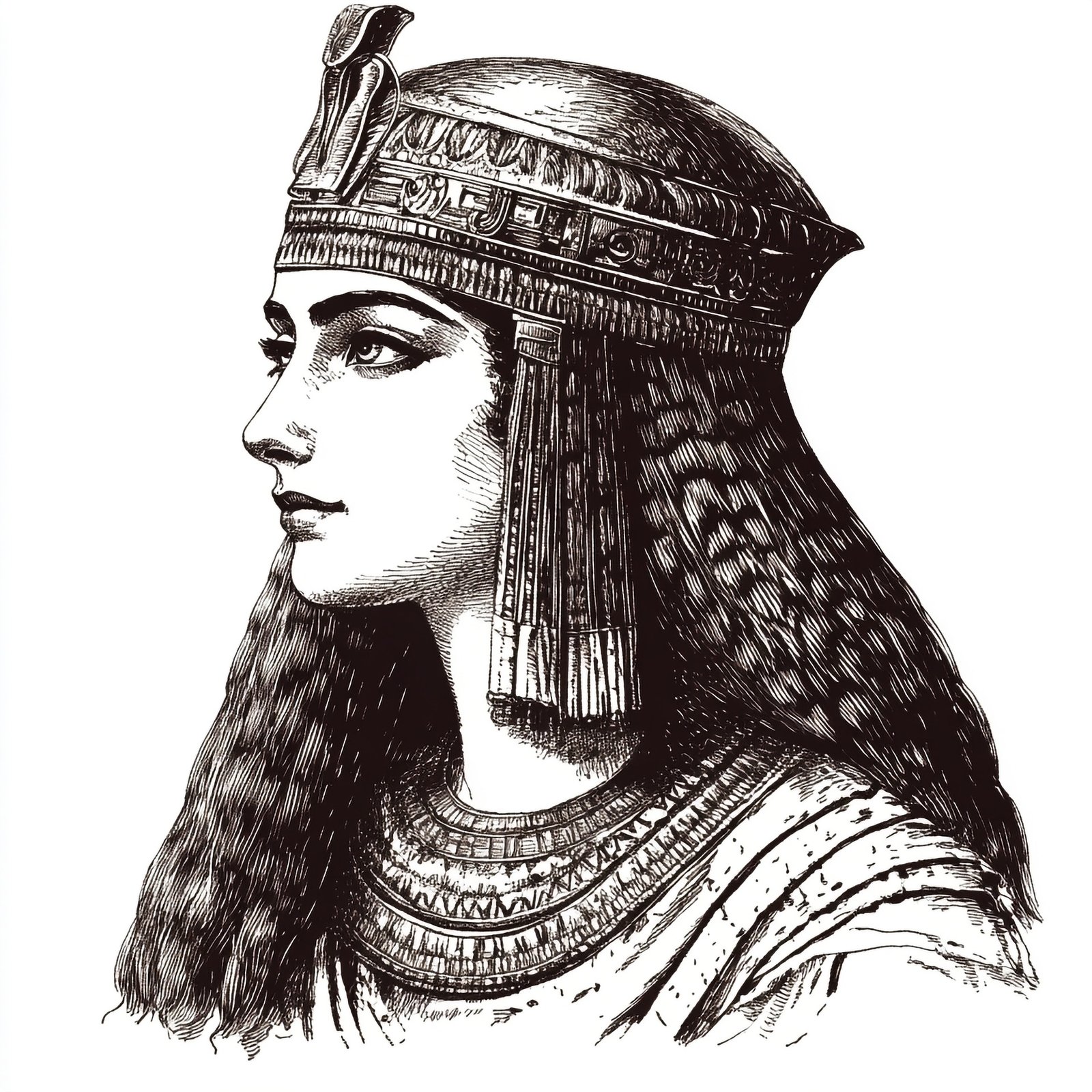Cleopatra VII is arguably one of the most studied and mythologized figures in history, being Egypt’s last reigning Pharaoh. Also known for her beauty, intelligence, and diplomatic finesse, Cleopatra’s life was interwoven with the epic dramas of Rome, political alliances, and ambitions for Egypt’s independence. In this article, we will be taking a closer look at the rise to power of Cleopatra, her relationship with Julius Caesar and Mark Antony, and the wide-ranging consequences of the actions undertaken by her both in Egypt and Rome. This is a fascinating tale of ambitions, intellect, and an unyielding quest for sovereignty.
Who Was Cleopatra
Though she was a member of the Ptolemaic dynasty, a Macedonian Greek family which had ruled Egypt for almost three centuries, Cleopatra VII was not from native Egyptian descent. Yet, she was exceptionally different in her attachment with the adopted country. While all the Ptolemaic rulers preferred to stick with Greek and Hellenistic culture, Cleopatra was different. She learned the Egyptian language, besides espousing other traditions of the Egyptians. Indeed, she literally became a ‘pharaoh’, in the truerst meaning of word, as she housed under her rule the Greek and Egyptian together, and was quite instrumental in garnering support from the Egyptian people.
She was educated and literate; she spoke many languages, including Egyptian, Greek, Latin, and more. In fact, she was able to conduct several successful diplomatic undertakings and be a well-read patron of the arts and sciences. Her bequest reflects her profound intellect besides an ambitious, tactical approach towards the throne of rulership. She has attracted the lion’s share of attention to her private and political life, both in ancient and modern times, thus being turned into one of the most mysterious rulers in history.
Cleopatra: The Egyptian Queen with Greek Roots
Cleopatra VII Philopator was part of the Ptolemaic dynasty, a Greek royal house that was initiated by Ptolemy I Soter, one of Alexander the Great’s generals. Following the death of Alexander, his empire burst into pieces, and Ptolemy took control of Egypt, starting a Greek line of rulers in Egypt. The Ptolemies indeed regarded some Egyptian traditions and deified themselves as successors to the old Pharaohs, yet for the most part kept Greek alive through writing and speaking Greek and ruling mainly from the somewhat Greek-influenced city of Alexandria.
Cleopatra was different due to the fact that she was actually interested in Egyptian culture. She alone among the leading Ptolemies learned the Egyptian language and even assumed the mantle of an Egyptian goddess, Isis. Familiarity with Egyptian culture won her respect and popularity among Egyptians, and her rule was much more stable and peaceful than that of her predecessors. It is this double identity as an Egyptian queen and a Greek ruler that allowed Cleopatra to move between the two cultures and thus derive loyalty from her people as well as from foreigners serving her.
Cleopatra’s Ascension and Early Power Struggles
With the death of her father, Ptolemy XII, Cleopatra found herself in quite a vulnerable position. According to Ptolemaic custom, she was to share a co-rulership with a younger brother, Ptolemy XIII, whom she was also to marry. It wasn’t long before tensions between Cleopatra and the advisors surrounding Ptolemy escalated to the point where she was compelled to flee into exile.
Determined to regain control, Cleopatra made a bold move upon the arrival of Julius Caesar in Alexandria. The legend goes that she had herself wrapped up in a carpet and smuggled into Caesar’s quarters. This audacious meeting was destined to forge an alliance that was going to alter the course of her fate and that of Egypt. Caesar helped Cleopatra regain her throne, and the two of them formed an alliance rather than political that would have consequences for Roman and Egyptian history.
Alliance with Julius Caesar: A Strategy for Survival
From the very outset, her liaison with Caesar was rooted in reason and necessity. In return for being associated with one of Rome’s most powerful individuals, she provided military protection to Egypt and a throne. Where Cleopatra was beautiful, she was also brilliant, her wit and intellect no doubt captivating Caesar as easily as her good looks did. The marriage was sealed with a son born to them, named Ptolemy XV, and his nickname was Caesarion.
She thus aspired that Caesarion could, one day, become the inheritor of both the thrones of Rome and Egypt and leave behind a united empires’ legacy of combined might. This was quite a bold ambition, which showed her foresight in desiring to establish a long-term future of independence for Egypt. She had been to Rome once before as Caesar’s guest; her presence was controversial, as many Romans feared her and her influence over Caesar because they felt she was working to direct Rome’s politics for the benefit of Egypt. The tension would remain during Cleopatra’s sojourn in Rome, representative of both the attraction and the threat of foreign influence.
The Aftermath of Caesar’s Assassination and Cleopatra’s Next Move
With Caesar’s assassination in 44 BCE, Cleopatra’s position became precarious. Upon Caesar’s death, she sailed back to Egypt to nurse her fortunes in that kingdom against the growing storms of Roman politics. Realizing that yet another strong ally was called for, Cleopatra now focused her attention on Mark Antony, one of Caesar’s most staunch allies and leaders of the new Roman triumvirate.
It was a politically significant alliance and at the same time fully charged on a personal level: Antony ruled Rome’s eastern provinces, including those bordering Egypt, while the wealth and resources of Cleopatra were invaluable to him. To Cleopatra, this alliance with Antony represented another step toward accomplishing two goals dear to her heart: stability inside Egypt and its autonomy. With Antony, she could continue to dream of an empire in which Egypt, finally, could hold its head high against the growing Roman influence.
Cleopatra and Antony: Love, Politics, and the Dream of Empire
The romance of Cleopatra and Antony is one of the most celebrated in annals, but it was also very much entangled with mutual political ambitions. Antony desperately needed various resources and riches that Cleopatra could provide to assert his position against Octavian, an adversary of Antony and the adopted heir of Caesar. On the other hand, in Antony, Cleopatra saw as both a protector for her throne and a partner in her vision for an independent Egyptian empire.
Cleopatra and Antony now joined in a bold enterprise for enlarging their power. They famously spent time together in Alexandria, throwing lavish feasts and living in luxury, symbolizing the wealth and allure of the East. At the same time, however, such demonstrations of their riches and power also appeared ridiculously excessive and licentious to many Romans, which Octavian was able to use to his advantage in turning the Roman Senate against them. Antony’s commitment to Cleopatra also alienated him from his Roman friends, who felt that he was reneging on Roman ways for a foreign queen.
The Battle of Actium: The Turning Point
The struggle between Antony and Octavian broke out as an open war in 31 BCE. The Battle of Actium was fought between the forces of Octavian and the combined fleets of Antony and Cleopatra. Together, with all their resources and combined power, Antony and Cleopatra lost the war turning point in both their lives and ancient history. Compelled by this defeat, Cleopatra and Antony fled to Alexandria, where they sought to regroup, but they found themselves cornered by the advancing forces of Octavian.
Following their defeat, Antony took his own life, seemingly believing that Cleopatra had already done the same. Cleopatra fled alone with her friend and decided to take her life without being captured by Octavian, who wanted to parade her as a trophy of war in Rome. According to legend, she used an asp’s venomous fangs to end her life, but there were many variations of her death.
Cleopatra’s Vision for Egypt and Her Enduring Legacy
All life long, Cleopatra has been possessed by a frenetic longing for an independent and powerful Egypt. She tried to enhance her country’s status in the ancient world by forging strategic alliances. During her rule, Egypt remained an affluent and vibrant state whose capital, Alexandria, had the status of a hub of intellectual and cultural influence.
The death of Cleopatra marked the end of the Ptolemaic dynasty and Egypt’s independence. When she died, Egypt turned into a Roman province, under the rule of Octavian, soon to be Augustus Caesar, founder of the Roman Empire. Cleopatra’s legacy lived on, however, as a symbol of intelligence, resilience, and ambition. Her life would inspire countless artistic works from ancient Roman sculptures and coinage to Shakespeare’s *Antony and Cleopatra* and modern films. She thus remains a source of intrigue, a symbol of the struggle for sovereignty and of the impact of the personal will on history.
Cleopatra’s Impact on Rome and Western Civilization
Cleopatra’s relationships with Caesar and Antony had far-reaching implications for Rome: as a direct result, the Roman Republic came to an end and the Roman Empire was established. The personal relationships she had with the two strongest Roman leaders at this time outlined the political fractures within Rome, where personal ambition most often took precedence over civic duty. Octavian used the influence that was upon Cleopatra to show Antony as a traitor, leveraging public opinion to secure his power to become Rome’s first Emperor, Augustus.
Through her life and legacy, Cleopatra had a lasting impact on Roman politics and culture, shaping the Western view of Egypt as a land of mystery, wealth, and wisdom. That she was able to demand respect from the most powerful leaders of her time speaks volumes about her intellect, her charm, and her political acumen.
Conclusion
Cleopatra’s life has become a saga of survival, ambition, and a quest to enjoy sovereignty in a world ruled by men. The alliances she made with Caesar and Antony are hugely controversial; yet, they were very important as strategic moves to salvage Egypt’s independence and to fashion a legacy that could outlive her reign. She was an intellectual and had a command over both Egyptian and Roman audiences-a feat quite unique in the annals of history.
Even in the centuries following her death, Cleopatra remains an icon of power, intellect, and the mystique of ancient Egypt. Her story is one about political power, the influence of relationships, and the strong resilience of a woman’s vision to set a course through history. Her legacy, being the last Pharaoh of Egypt, along with what took place on account of her relationship with Rome, makes Cleopatra one of the most interesting and timeless figures in history.






